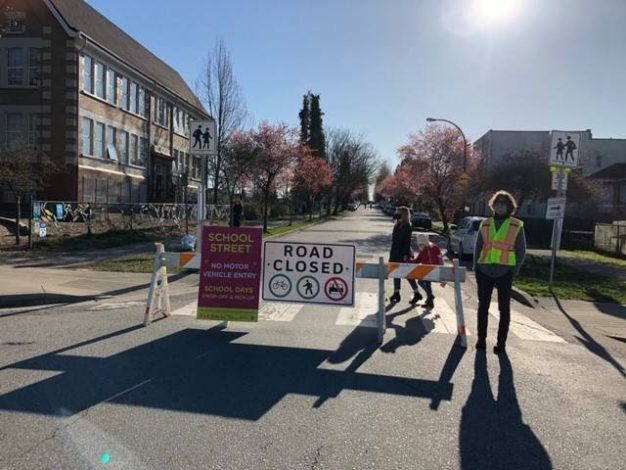
School Streets pilot up and running in Vancouver
Vancouver’s plan to create safe ‘School Streets’ is gaining pace as the city launches a month-long pilot at three elementary (primary) schools.
Volunteers will be leading the roll-out of the programme, which creates a car-free block next to a school which is open only to walking and cycling, and runs during the drop-off and collection times.
Between now and May 7, the city is working with the Vancouver School Board on the pilot, which has several goals, the key ones being improving safety, encouraging green travel initiatives and reducing carbon emissions. They are part of the Climate Emergency Action Plan and Transportation 2040 Plan.
Kennedy Stewart, Mayor of Vancouver, said: “Children are one of our most vulnerable road users and it’s crucial they have safe public spaces for physical activity – like the block outside their school. Partnering with the VSB on this pilot will allow kids to walk, bike or roll safely as they arrive and leave school.”
‘It’s crucial children have public spaces for physical activity’
The School Streets initiative has already been successfully introduced in several countries, most notably in the United Kingdom, and have been shown to reate a safer environment for children, improve air quality, reduce congestion and vehicle volumes. Crucially, within the context of the ongoing COVID-19 pandemic, it has also been able to maintain social/physical distancing requirements to help people stay safe.
Carmen Cho, Chair of Vancouver School Board, said: “The Vancouver School Board is dedicated to promoting active transportation, as outlined in the District’s Environmental Sustainability Plan. We hope many students will take this opportunity to experience walking, cycling or rolling to school.”
Stephen Leung, Principal of Van Horne Elementary School said that more than 75 per cent of parents at the school were keen to try the pilot, and he hoped it would encourage active travel and reduce traffic volumes around the school during pick-up and drop-off times.
Staff will monitor the pilot, collect feedback from the school community and residents and give feedback on their main findings. It will also provide information on whether establishing School Streets at other schools may be feasible.
Consulting with school communities
In November 2020, City Council approved the Climate Emergency Action Plan. This included direction to develop a Transportation Demand Management Action Plan that includes expanded School Active Travel Planning Program offerings.
In October 2019, Council passed a motion on “Improving Transportation Safety Around Vancouver Schools”, which is a core objective of the School Active Travel Planning Program. Established in 2012, the School Active Travel Planning Program consults with school communities and other stakeholders to identify transportation-related challenges and opportunities, improve safety, and increase the number of children walking and cycling to school.
In 2018, the Vancouver School Board approved the District’s first ever Environmental Sustainability Plan. The goals outlined in the plan include to support active transportation choices for school communities, and to support low-carbon transportation.




